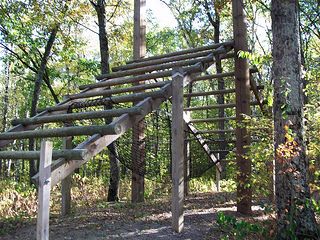How to Conquer the Obstacle Courses of Life
by Gabriella Kroska - June 20, 2013
 A challenging obstacle course turned out to be more difficult than I imagined. Here are some lessons I learned for facing the obstacles of life.
A challenging obstacle course turned out to be more difficult than I imagined. Here are some lessons I learned for facing the obstacles of life.
Recently, I attended a leadership camp through my high school. As part of the camp, we went through a confidence course. The course was intended to increase campers’ confidence in their ability to face challenges. The course included a series of obstacles, similar to the ones you might find in a summer camp ropes course. However, this course had to be completed independently. Your teammates were there, but could not help you complete the course. Or could they?
The last obstacle of the day was optional—it was more difficult and required more courage than the rest of the obstacles. It consisted of two log ladders (about 20 feet high), set on a slant. They were supported by other logs so that they each stood alone, with a two-foot gap between them at the top. Each rung was about two feet up from the last. There was a net underneath the contraption, in case someone was to fall. Your task was to climb up one side, cross over the two-foot gap and climb down the second side. Simple, right? Maybe not.
Obstacles in life
The obstacles in the course represent the trials we will face in life. Trials—whether they are sickness, the loss of a job, a shaky relationship, or any number of other things—are things we all experience in life. Often trials may look “easy” from the ground or when someone else is going through them. It is when we are in the trial that it sometimes seems insurmountable.
Back to the obstacle course. It didn’t look too terrible while you were on the ground. In fact, it looked quite simple. But when you got to the top, 20 feet up in the air, that two-foot gap suddenly seemed a lot farther. When each of us got to the top, we hesitated. How were we going to cross over that gap? The longer we stared at the ground, the more terrifying the gap became. Similarly, our perspective often changes in the middle of a trial. We may lose sight of the main goal, the Kingdom of God, or convince ourselves that the trial is an impossible challenge.
The importance of encouragement
So, how did we overcome that trial? One of the tools we had was our teammates. Even though they couldn’t climb up and help us across, they could offer verbal help. They could offer encouragement. They could remind you of how far you had come and of your ultimate goal—completing the course.
When we are going through trials, we need our brethren to help us through. The Bible teaches that Christians are to be there for each other: “And let us consider one another in order to stir up love and good works, not forsaking the assembling of ourselves together … but exhorting one another” (Hebrews 10:24-25). As my friends continually encouraged me, their voices drowned out the discouraging thoughts running through my mind. They reminded me that, yes, I could cross the gap. Yes, I could complete the obstacle; and yes, I could finish the course!
The importance of example
I wasn’t the first camper to commit to crossing the obstacle. There were a few who went ahead of me. I gained confidence from watching and knowing that the obstacle was indeed one that I could conquer. In Hebrews 11 we are given numerous examples of those who lived godly lives while enduring trials. Following this list of powerful examples, we read: “Therefore we also, since we are surrounded by so great a cloud of witnesses [those who have gone before us], let us lay aside every weight, and the sin which so easily ensnares us, and let us run with endurance the race that is set before us” (Hebrews 12:1). We are to take comfort and encouragement from the success of those who have gone before us!
The greatest help through trials
There was one more tool I was given to cross that gap. There were a couple of officers on the ground who had completed the course many times and were able to give direction to the campers completing the course. However, if you were going to make use of their knowledge, you first had to trust that they knew what they were doing, and you had to act on that trust.
We have an even greater tool to help us through our trials! That tool is the Bible! God gives us instructions for living our lives (2 Timothy 3:16). We are also able to talk to God through our prayers. If we put our trust in Him, we will be able to come through our trials.
In the end, between the encouragement of my friends and the guidance of the officers, I was able to cross the gap and complete the course! Though I had to do the work on my own, I was able to succeed because of the help I did have.
As we go through life, though we often have to deal with trials on our own, let’s always remember to make use of our greatest resources: the encouragement of our brethren; the examples of others; and, most importantly, the guidance of God’s Word!
Gabriella Kroska is currently a senior in high school taking dual-credit college courses at St. Cloud State University. She will graduate next year with her high school diploma and an Associate’s degree. She attends the Twin Cities, Minnesota congregation of the Church of God, a Worldwide Association.
Continue Reading

El Dorado
by Joshua Travers - June 14, 2013

The Little Big Things
by Kathlyn Mae Tiu - April 16, 2013
